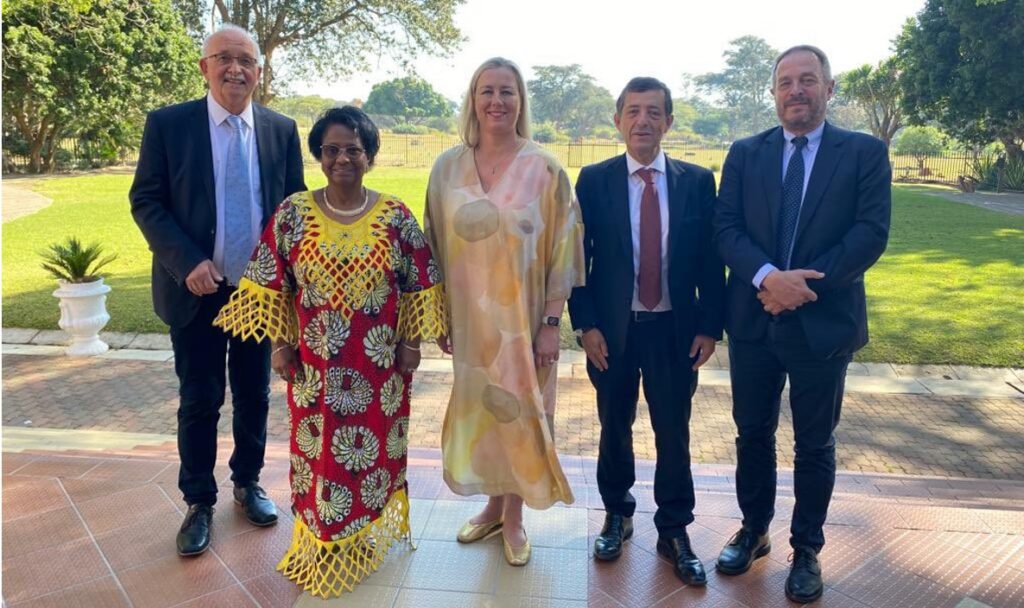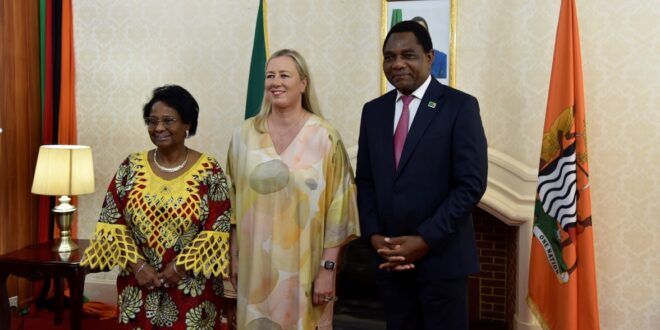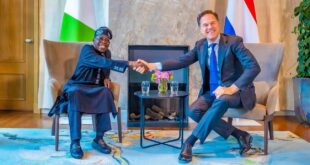Dr. Pierrette Herzberger-Fofana, member of the European Parliament, writes on a recent visit of the European Parliament’s Development Committee to Zambia where its delegation met the country’s president and discussed the recent African leaders’ initiative to end the war between Russia and Ukraine.
—–
From 19 to 21 June 2023, the European Parliament’s DEVE Development Committee carried out a joint visit to Zambia with the European Commissioner for International Partnerships, Ms Jutta Urpilainen.
I was the head of the DEVE delegation as 1st vice-president of the committee and was accompanied by my colleagues, the MEPs Mr György Hölvényi from Hungary, Mr Udo Bullmann from Germany and Mr Carlos Zorrinho from Portugal.
Ms Jutta Urpilainen and I held a meeting with the President of Zambia, HE Hakainde Hichilema, behind closed doors. He informed us about his official visit to Ukraine, which he undertook as a member of the delegation of seven African leaders.
The African presidents describe their visit as a peacekeeping mission. The delegation included the heads of state of South Africa, Zambia, Senegal and Comoros, the Egyptian Prime Minister and senior diplomats from the Democratic Republic of Congo and Uganda.
African countries have been directly affected by ongoing war since February 2022, as many rely on grain and fertilizer supplies from Ukraine and Russia to feed their populations. Any increase in the price of basic foodstuffs has a particularly negative impact on the poor population.
The shocking destruction, the massive bombings in Ukraine urgently calls for an end to the war. The African presidents want to hear both parties and are trying to do everything they can to bring Russia to the negotiating table. Both parties are willing to negotiate, but insist on their own demands.

The delegation at the State House, Lusaka, Zambia. From left to right: Prof. Udo Bullmann (MEP), Dr. Pierrette Herzberger-Fofana (MEP), Commissioner Jutta Urpilainen, Prof. Zorrinho and György Hölvényi (MEP)/Photo: DEVE Photo Press
A historic mission of African heads of state.
This visit is a separate initiative of the African heads of state, they did not travel to Ukraine and Russia on behalf of either the EU or USA. For this, President Hichilema used a metaphor, “when a couple had problems, you hear both the man and the woman. In this sense, we want to talk to both parties“.
It is in this spirit, that they would like to address the two warring parties. This historic mission in search of peace consists of ten key points. This is why the heads of state wanted to listen to both President Zelensky and President Putin, so that they could both explain how they see the road to peace.
President Hichilema concluded that when you see an entire country destroyed, you can only be against such aggression. The delegation of African heads of state themselves heard gunfire during their stay as Hichilema said “we heard rocket fire during our visit and even had to take refuge for a few hours. Such acts are not conducive to peace”. It was indirectly a slight criticism of Russia.
The African leaders were appalled by the extent of the war destruction, from which even churches and religious institutions were not spared. In their talks with Russia, the African presidents drew attention to the fact that Russia, as a founding member of the UN after the Second World War, has committed itself to defending peace and preventing war, “to practice tolerance and to live together in peace as good neighbours“.
The war massively violates the first points of the preamble to the UN Charter. The first attempt of the 7 African Presidents can be understood as a sign, that this war affects everyone and that everyone hopes for a dialogue that could lead to peace.
Africa, however, is divided in its stance on the war against Ukraine. When the UN General Assembly called by a large majority for the withdrawal of Russian troops from Ukraine in February, 30 African states joined the resolution, but 24 did not. Zambia voted in favour of the resolution, as did the European Union.
The role of sanctions
Most of them abstained. The EU’s sanctions are in addition to the measures already imposed on Russia since 2014 for the annexation of Crimea and the non-implementation of the Minsk agreements. They include targeted restrictive measures and economic sanctions, as well as individual visa restrictions.
The goal of economic sanctions is to impose severe consequences on Russia for its actions and weaken its ability to continue aggression. Individual sanctions are directed against persons who threaten the territorial integrity, sovereignty and independence of Ukraine or take advantage of such actions.
In order to hit the Russian economy, the EU has banned the provision of utilities for the activities of the Russian state apparatus or a legal entity based in Russia. We must not allow aggression and violence to go unpunished.
The Russian head of state, Putin, welcomed “the balanced approach of our African friends in the Ukrainian crisis”. At the same time, he expressed his openness to “constructive dialogue with all those who want to build a peace based on the principles of justice and respect for the legitimate interests of the parties”. said Poutine.
At the joint press conference, Volodymyr Selenskyj, President of Ukraine, expressed his praise for this visit at a time of war:
I would like to thank the participants in our meeting for their commitment to the principle of territorial integrity. The presidents and prime ministers were also able to see for themselves in Boutcha that Russian occupation means death. It is sad to see that the war is still ongoing. But Ukraine is not alone: it is receiving a great deal of international support.
During President Zelenskyi’s visit to the European Parliament in February this year, EP President Roberta Metsola said “The EU supports Ukraine financially, morally and for as long as necessary”. Peace can only be achieved if Russia puts an end to the war and the two belligerents sit down at the negotiating table.
This noble initiative will award Africa the role of mediator on the international policy scene.
 THE AFRICAN COURIER. Reporting Africa and its Diaspora! The African Courier is an international magazine published in Germany to report on Africa and the Diaspora African experience. The first issue of the bimonthly magazine appeared on the newsstands on 15 February 1998. The African Courier is a communication forum for European-African political, economic and cultural exchanges, and a voice for Africa in Europe.
THE AFRICAN COURIER. Reporting Africa and its Diaspora! The African Courier is an international magazine published in Germany to report on Africa and the Diaspora African experience. The first issue of the bimonthly magazine appeared on the newsstands on 15 February 1998. The African Courier is a communication forum for European-African political, economic and cultural exchanges, and a voice for Africa in Europe.


























